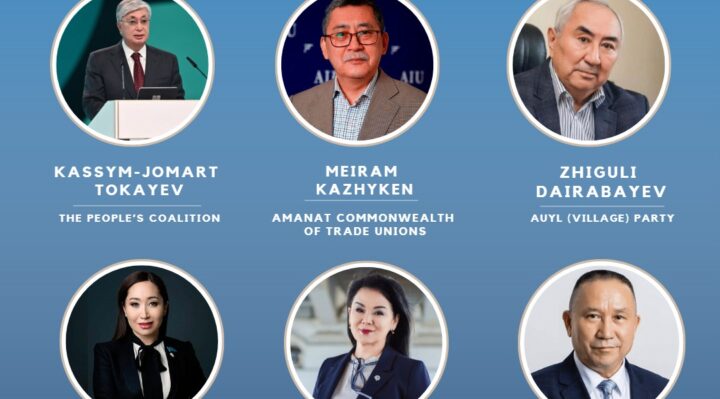Kazakhstan’s Central Electoral Commission (CEC) registered six candidates to qualify for the country’s Nov. 20 presidential election.
This will be the seventh presidential election held since Kazakhstan’s independence in 1991.
Registration closed Oct. 21 and six candidates, incumbent Kassym-Jomart Tokayev, Meiram Kazhyken, Zhiguli Dairabayev, Karakat Abden, Saltanat Tursynbekova and Nurlan Auesbaev, will campaign until Nov. 18 for election to the country’s highest office.

The candidates were required to collect at least 1 percent of the country’s registered voters or 118,273 valid voter signatures, in support of their candidacy.
President Tokayev first announced his proposal to hold the early election in his state-of-the-nation address on September 1, 2022. He explained that “for the successful implementation of radical and comprehensive reforms aimed at building a Just Kazakhstan, a new mandate of trust of the people is required.”
In the same address, President Tokayev also proposed to limit the presidential term to a single seven-year period without the right to re-election (previously two five-year terms).
The President explained that “limiting the presidential mandate to one term will ensure the maximum focus of the head of state on the strategic tasks of national development”.
Who are the presidential candidates?
· Kassym-Jomart Tokayev (incumbent President) – candidate of the People’s Coalition (unites over 30 non-governmental organisations and parties).
· Karakat Abden – National Alliance of Professional Social Workers. She is a public figure, a member of the National Commission for Women Affairs, Family and Demographic Policy.
· Meiram Kazhyken – Commonwealth of Amanat Trade Unions. He is the head of the Astana School of Economics at the Astana International Science Complex (ISCA).
· Nurlan Auesbayev – National Social Democratic Party (NSDP). He is the head of the NSDP’s Astana division.
· Saltanat Tursynbekova – Qazaq analary – dasturge zhol (Kazakh mothers are a path to traditions) public association. She is a human rights activist, who focuses on women’s and children’s rights.
· Zhiguli Dairabayev – Auyl party. He is the chair of the Agro-Industrial Complex Committee at the Atameken National Chamber of Entrepreneurs and the chair of the Association of Farmers.
Electoral standards and international observers
President Tokayev emphasized that the election campaign will be conducted in strict accordance with the law, it will be held fairly, openly and with the broad participation of domestic and international observers.
It has been confirmed that international observers will be invited to Kazakhstan to cover the election to ensure openness and transparency during the electoral campaign.
Foreign journalists can cover the election once they are accredited by the Ministry of Foreign Affairs of Kazakhstan.
Accreditation of observers of foreign states and international organisations ends on November 14.
Background to Kazakhstan’s electoral system
· The Republic of Kazakhstan is a unitary state with a presidential form of government.
· Kazakhstan’s Constitution defines free elections as the fundamental principle of organising state power, and the people as the bearer of sovereignty and the only source of state power.
· A competitive system ensures that different political parties and candidates can participate in elections. They all enjoy freedom of speech, assembly, and movement to make their political views heard.
· According to the provisions of the Constitution and legislation, presidential elections is held on the basis of universal, equal and direct suffrage by a secret ballot.
· The President of Kazakhstan is elected using the two-round system; if more than two presidential candidates are included in the ballot and no one receives a majority of the vote in the first round, a second round is held between the top two candidates.
· Following amendments to legislation last year, a “none of the above” option was introduced on the ballots. This option will also be in place for the upcoming presidential election.
· Following amendments to the Constitution earlier this year, the President of Kazakhstan is elected for a single term of seven years.
· The Central Election Commission (CEC) of Kazakhstan will be responsible for organising and conducting the early presidential election.
